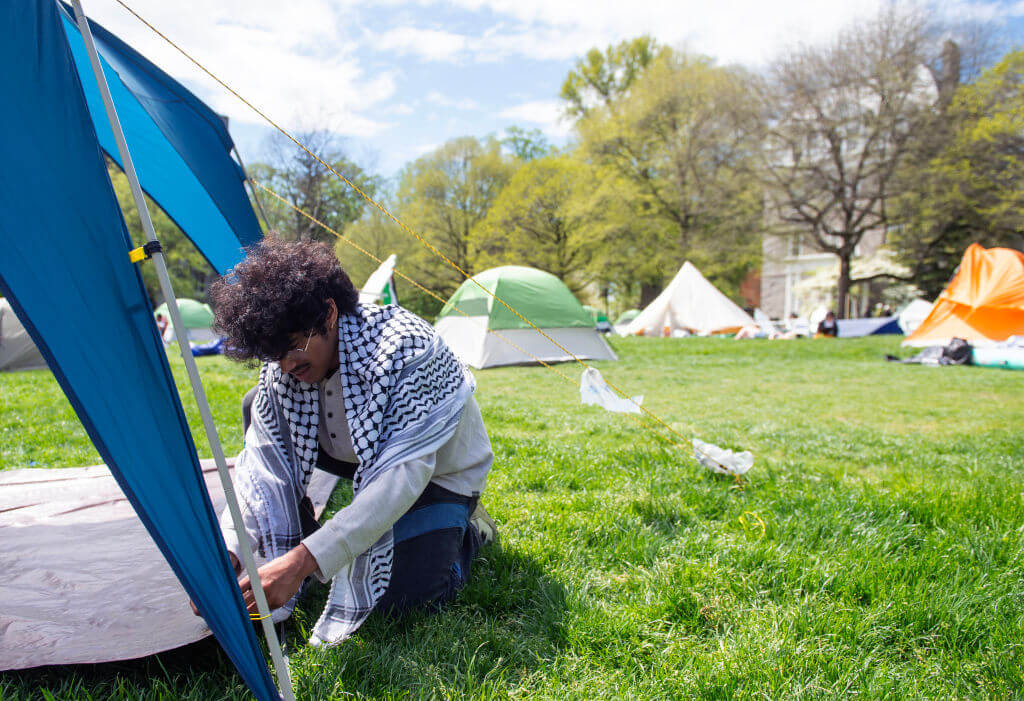Campus encampments return one year later, and pro-Palestinian protests spark 15 arrests
Pro-Palestinian protests at Swarthmore College, UCLA, and Rutgers lead to arrests

Demonstrators occupy a makeshift protest camp at Swarthmore College on April 24, 2024. A year later, the encampment was recreated. Photo by Matthew Hatcher/Getty Images
As college campuses enter commencement season, the final weeks of the academic year have become a flashpoint for pro-Palestinian protests — and have occurred around the anniversary of several 2024 encampments. Over the past several days, 15 students have been arrested at demonstrations on campuses from California to New Jersey, in scenes that underscore the mounting tensions between student activists, university administrators and federal authorities under pressure to respond.
At Swarthmore College, an elite liberal arts college in Pennsylvania, police dismantled a four-day pro-Palestinian encampment early Saturday morning, arresting nine individuals — including one current and one former student. The remaining seven, according to Swarthmore President Valerie Smith, were “not members of the college community.”
The encampment, which began Wednesday, included masked individuals who refused to identify themselves, a violation of campus policy. By Thursday, the college said it had discovered that the protesters had vandalized campus property they used to build the encampment. “We tried talking with the protestors,” Smith wrote in a campus-wide message, “but they refused to engage in any substantive conversation about ending the encampment.”
The protest was organized by the suspended chapter of Students for Justice in Palestine and included calls for Swarthmore to divest from Cisco Systems, which activists allege has ties to Israeli surveillance efforts.
Swarthmore is one of at least 60 universities under investigation by the U.S. Department of Education for possible civil rights violations related to antisemitism. According to Bloomberg News, the FBI had contacted the school and urged it to shut down the encampment — a rare move that signals just how closely federal officials are monitoring campus activism.
The arrests at Swarthmore were not isolated.
The University of California, Los Angeles reported the arrest of three protesters on April 30, marking the one-year anniversary of an attack on a campus encampment last spring. The group was preparing to show The Encampments, a documentary that features Mahmoud Khalil, leader of the pro-Palestinian protests at Columbia University whose attempted deportation was the first of many this spring. This event, like the one at Swarthmore, was organized by the school’s suspended chapter of Students for Justice in Palestine.
The university’s administration defended its response, noting in a statement that “our greatest responsibility as leaders of this university is to keep our students safe. That is our north star.”
The third campus with arrests related to the Israel-Hamas war was Rutgers University in New Jersey, where three students and one unaffiliated individual were detained on April 29 during a protest outside a Hillel-hosted roundtable event featuring Rep. Josh Gottheimer. A Jewish Democrat and outspoken supporter of Israel, Gottheimer is currently running in the Democratic primary for New Jersey governor.
The protest escalated when a 25-year-old who is not affiliated with the university breached the protest line and resisted arrest, allegedly assaulting an officer in the process. He now faces multiple charges, including aggravated assault and inciting a riot.
At Dartmouth College in New Hampshire on Thursday, around 65 people attended a candlelight vigil at the same spot where a year earlier police had arrested 89 people who had set up a pro-Palestinian encampment. This time, though tents were set up, the college negotiated with student organizers and no arrests were made.
The burst of activity comes at a moment of maximum visibility for student activism — and maximum risk for universities. Commencement season, long a symbol of academic unity and celebration, has become a target for protest in recent years, and colleges are now bracing for possible disruptions during graduation ceremonies. For activists, the final weeks of the school year represent the last chance to make their voices heard before summer break.














